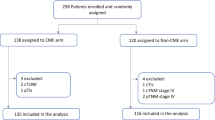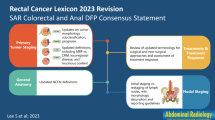Abstract
Purpose
Treatment strategies for low rectal cancer have been evolving toward achieving less treatment morbidity with the same oncological success—we aimed to assess the results of the new watch and wait (W&W) strategy in our cohort.
Methods
A tertiary care cohort study was conducted. New patients with rectal adenocarcinoma up to 6 cm from the anal margin, cM0, locally staged higher than cT1N0, evaluated between November 2014 and October 2018, were included. All 93 patients received neoadjuvant radiotherapy ± chemotherapy. Re-evaluation was planned 8–12 weeks after the end of treatment. Patients showing clinical complete response (cCR) were given the choice of either to proceed to surgery or to enter W&W.
Results
Of the 93 patients, 82.8% were re-evaluated and 20.8% had cCR. Patients in clinical stages II/III were significantly less likely to achieve cCR than those in stage I (p = 0.017).
After a mean follow-up of 17.44 months, there were 4 regrowths in the 16 patients under W&W, all submitted to R0 surgery, ypN0; there were no deaths or local recurrences; one patient with regrowth had distant recurrence.
Sixty patients underwent direct surgery after a mean follow-up of 16.23 months; 3 patients had local and distant recurrences; 7 others had only distant recurrences; there were 8 deaths.
There were no statistically significant differences between patients under W&W and patients who underwent direct surgery regarding local or distant recurrences, or death (p > 0.9; p = 0.44; p = 0.19, respectively).
Conclusion
The W&W strategy for low rectal cancer achieved the same oncological outcomes as the traditional strategy while sparing some patients from surgery.

Similar content being viewed by others
References
Battersby NJ, Dattani M, Rao S et al (2017) A rectal cancer feasibility study with an embedded phase III trial design assessing magnetic resonance tumour regression grade (mrTRG) as a novel biomarker to stratify management by good and poor response to chemoradiotherapy (TRIGGER): study protocol for a randomised controlled trial. Trials 18:394
Bernier L, Balyasnikova S, Tait D et al (2018) Watch-and-wait as a therapeutic strategy in rectal cancer. Curr Colorectal Cancer Rep 14:37–55
Bjerkeset T, Edna TH (1996) Rectal cancer: the influence of type of operation on local recurrence and survival. Eur J Surg 162:643–648
Bosman FT, Carneiro F, Hruban RH, et al. WHO Classification of Tumours of the Digestive System. IARC Press, 2010:134-146.
Bosset J, Collette L, Calais G et al (2006) Chemotherapy with preoperative radiotherapy in rectal cancer. N Engl J Med 355:1114–1123
Dalton R, Velineni R, Osborne M et al (2011) A single-center experience of chemoradiotherapy for rectal cancer: is there potential for nonoperative management? Colorectal Dis 14:567–571
de Campos-Lobato L, Stocchi L, da Luz Moreira A et al (2011) Pathologic complete response after neoadjuvant treatment for rectal cancer decreases distant recurrence and could eradicate local recurrence. Ann Surg Oncol 18:1590–1598
Edge S, Byrd DR, Compton CC, et al. (eds) (2010) AJCC Cancer Staging Manual and Handbook. Springer-Verlag, New York
Grumman M, Noack E, Hoffmann I et al (2001) Comparison of quality of life in patients undergoing abdominoperineal extirpation or anterior resection for rectal cancer. Ann Surg 233:203–213
Habr-Gama A, Perez R, Wynn G et al (2010) Complete clinical response after neoadjuvant chemoradiation therapy for distal rectal cancer: characterization of clinical and endoscopic findings for standardization. Dis Colon Rectum 53:1692–1698
Habr-Gama A, Gama-Rodrigues J, São Julião G et al (2014) Local recurrence after complete clinical response and watch and wait in rectal cancer after neoadjuvant chemoradiation: impact of salvage therapy on local diseases control. Int J Radiation Oncol Biol Phys 88:822–828
Habr-Gama A, Lynn PB, Jorge JM et al (2016) Impact of Organ-Preserving Strategies on Anorectal Function in Patients with Distal Rectal Cancer Following Neoadjuvant Chemoradiation. Dis Colon Rectum 59:264–269
Habr-Gama A, São Julião GP, Gama-Rodrigues J et al (2017) Baseline T classification predicts early tumor regrowth after nonoperative management in distal rectal cancer after extended neoadjuvant chemoradiation and initial complete clinical response. Dis Colon Rectum 60:586–594
Hill GL, Rafique M (1998) Extrafascial excision of the rectum for rectal cancer. Br J Surg 85:809–812
Maas M, Beets-Tan R, Lambregts D et al (2011) Wait-and-see policy for clinical complete responders after chemoradiation for rectal cancer. J Clin Oncol 29:4633–4640
Milgrom S, Goodman K (2014) Non-operative management of locally advanced rectal cancer. Seminars Colon Rectal Surg 25:22–25
Patel U, Taylor F, Blomquist L et al (2011) Magnetic resonance imaging-detected tumor response for locally advanced rectal cancer predicts survival outcomes: mercury experience. J Clin Oncol 29:3753–3760
Peeters KC, van de Velde CJ, Leer JW et al (2005) Late side effects of short-course preoperative radiotherapy combined with total mesorectal excision for rectal cancer: increased bowel dysfunction in irradiated patients—a Dutch colorectal cancer group study. J Clin Oncol 23:6199–6206
Perez RO, Habr-Gama A, Gama-Rodrigues J, et al (2012) Accuracy of positron emission tomography/computed tomography and clinical assessment in the detection of complete rectal tumor regression after neoadjuvant chemoradiation: long-term results of a prospective trial (National Clinical Trial 00254683) Cancer 118:3501–3511.
Pucciarelli S, Capirci C, Emanuele U et al (2005) Relationship between pathologic T-stage and nodal metastasis after preoperative chemoradiotherapy for locally advanced rectal cancer. Ann Surg Oncol 12:111–116
Ross A, Rusnak C, Weinerman B et al (1999) Recurrence and survival after surgical management of rectal cancer. Am J Surg 177:392–395
Sauer R, Becker H, Hohenberger W et al (2004) Preoperative versus postoperative chemoradioterapy for rectal cancer. N Engl J Med 324:709–715
Smith J, Ruby J, Goodman K et al (2012) Nonoperative management of rectal cancer with complete clinical response after neoadjuvant therapy. Ann Surg 256:965–972
van der Valk MJM, Hilling De, Bastiaannet E et al (2018) Long-term outcomes of clinical complete responders after neoadjuvant treatment for rectal cancer in the International Watch & Wait Database (IWWD): an international multicentre registry study. Lancet 391:2537–2545
Wang Y, Cummings B, Catton P et al (2005) Primary radical external beam radiotherapy of rectal adenocarcinoma: long term outcome of 271 patients. Radiother Oncol 77:126–132
Funding
No funding was received for this work.
Author information
Authors and Affiliations
Contributions
All authors participated in the conception and design of the study; all authors collected and analyzed data for the study and performed the treatments and/or the diagnostic examinations on the study patients, according to their medical specialty; João Cortez Pinto and Isadora Rosa drafted the article. All authors revised the article critically for important intellectual content and gave approval of the final version to be submitted.
Corresponding author
Ethics declarations
Conflict of interest
Isadora Rosa reports grants, personal fees or non-financial support from ABBVIE, FERRING, MSD, TAKEDA, PHARMAKERN, JANSSEN, and DR FALK PHARMA, outside the submitted work; the remaining authors have nothing to disclose.
Ethics approval
The study was approved by IPOLFG’s Ethics Committee and Investigation Unit (Approval 119/2014) and developed according to the Helsinki Declaration principles.
Consent to participate
All patients gave informed consent for every diagnostic and/or therapeutic procedure/strategy.
Consent for publication
All authors approved the final version of the manuscript for publication.
Availability of data and material
All data and material are held by the authors’ institution and may be available upon request.
Additional information
Publisher's Note
Springer Nature remains neutral with regard to jurisdictional claims in published maps and institutional affiliations.
Rights and permissions
About this article
Cite this article
Pinto, J.C., Pereira, A.D., Pimenta, A. et al. Low rectal cancer treatment strategies: a cohort study assessing watch and wait. J Cancer Res Clin Oncol 146, 2631–2638 (2020). https://doi.org/10.1007/s00432-020-03248-0
Received:
Accepted:
Published:
Issue Date:
DOI: https://doi.org/10.1007/s00432-020-03248-0




